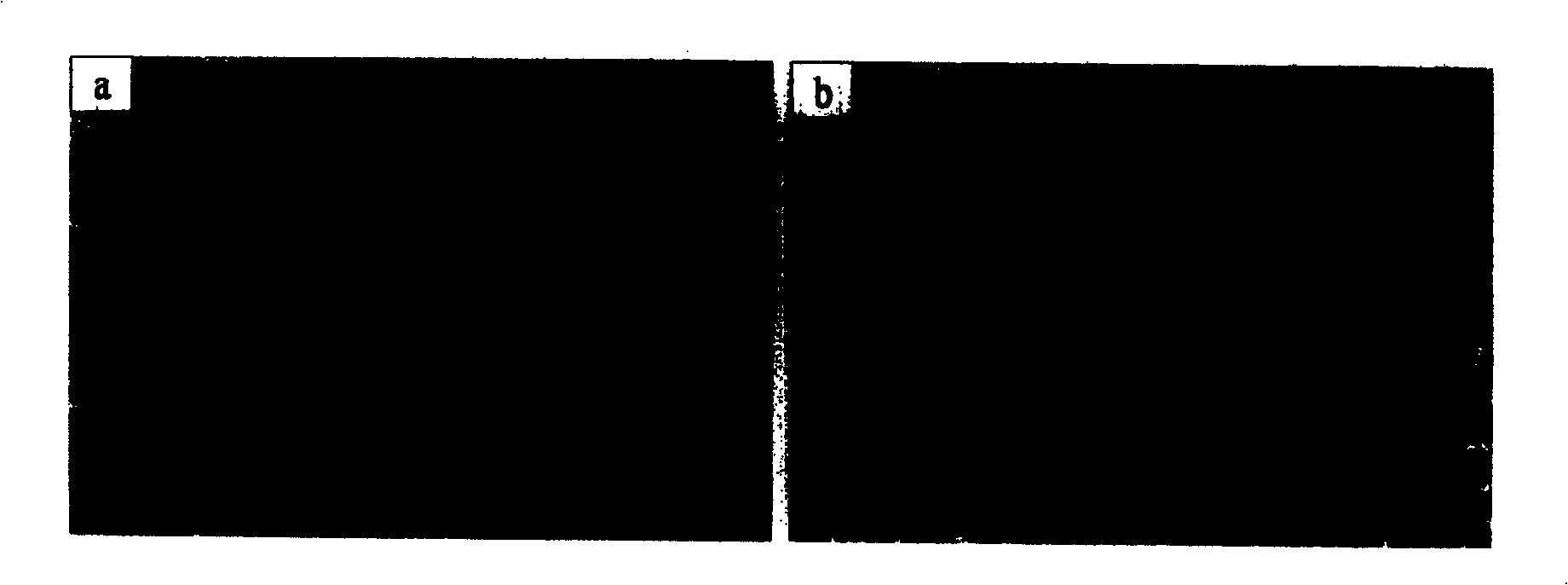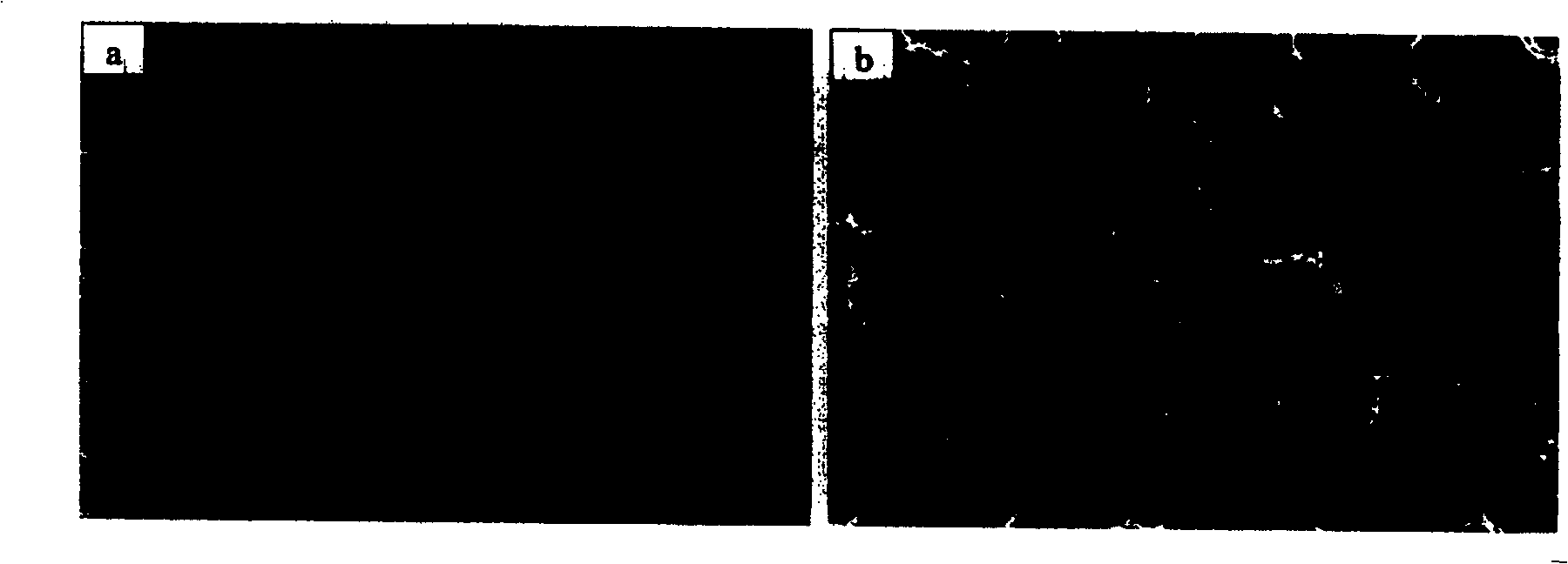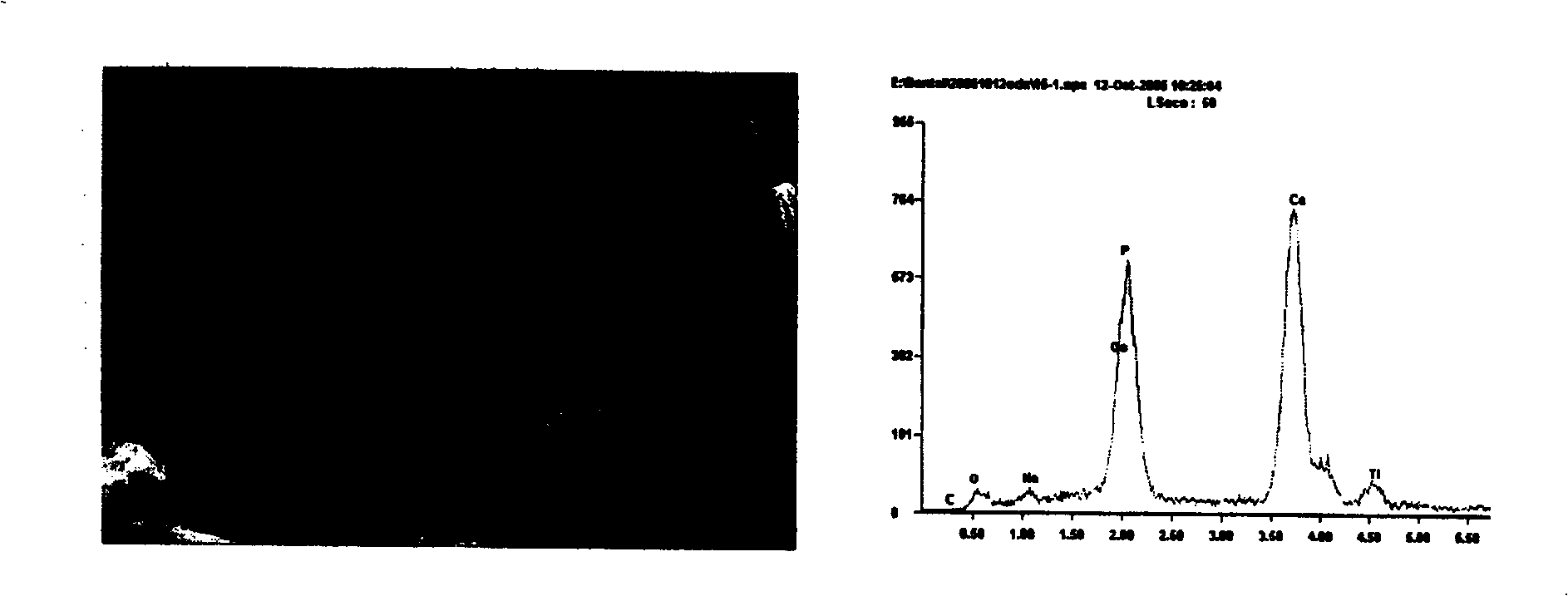Production of porous structure with biological activity on surface of pure-titanium tooth implantation
A technology of dental implants and porous structures, used in dental preparations, dental prostheses, dentistry, etc., can solve the problem that materials do not have the function of promoting or inducing osteogenesis, and achieves improved clinical success rate and good bone tissue compatibility. Effect
- Summary
- Abstract
- Description
- Claims
- Application Information
AI Technical Summary
Problems solved by technology
Method used
Image
Examples
Embodiment 1
[0019] (1) The surface of the pure titanium dental implant is sandblasted with large particles of 0.25-1.5mm emery, and the pressure is 0.4MPa, so that the surface forms an irregular rough surface with ups and downs, that is, micron-sized pits, and then placed in acetone, concentration Ultrasonic cleaning with 75% ethanol and distilled water, and drying;
[0020] (2) Use 0.09mol / L HF and 0.11mol / L HNO 3 The formed mixed solution was processed for 5 minutes, rinsed with double distilled water, and dried;
[0021] (3) Use 5.60mol / L HCl and 9.20mol / L HCl again 2 SO 4 The mixture was treated at 70°C for 40 minutes, rinsed with double distilled water, and dried;
[0022] (4) Last 8.0mol / L H 2 o 2 Treat with 0.15mol / L HCl mixture at 80°C for 20 minutes, then heat-treat at 400°C for 1.5 hours, and cool naturally to obtain a surface with a bioactive porous structure; make TiO on the surface of pure titanium 2 The layer is transformed into an anatase crystal phase structure, whic...
Embodiment 2
[0025] (1) The surface of the pure titanium dental implant is sandblasted with large particles of 0.25-1.5mm emery, and the pressure is 0.4MPa, so that the surface forms an irregular rough surface with ups and downs, that is, micron-sized pits, and then placed in acetone, concentration Ultrasonic cleaning with 75% ethanol and distilled water, and drying;
[0026] (2) Use 0.13mol / L HF and 0.07mol / L HNO 3 The formed mixed solution was processed for 15 minutes, rinsed with double distilled water, and dried;
[0027] (3) Use 6.00mol / L HCl and 8.70mol / L HCl again 2 SO 4 The mixture was treated at 90°C for 20 minutes, rinsed with double distilled water, and dried;
[0028] (4) Last 10.0mol / L H 2 o 2 Treat with 0.05mol / L HCl mixed solution at 80°C for 30 minutes, then heat-treat at 400-500°C for 0.5 hour, and cool naturally to obtain a surface with a biologically active porous structure; make TiO on the surface of pure titanium 2 The layer is converted into an anatase crystal p...
Embodiment 3
[0030] (1) The surface of the pure titanium dental implant is sandblasted with large particles of 0.25-1.5 mm emery at a pressure of 0.4 MPa, then ultrasonically cleaned in acetone, 75% ethanol, and distilled water, and dried;
[0031] (2) Use 2.75mol / L HF and 3.94mol / L HNO 3 The mixture was treated for 2 minutes, rinsed with double distilled water, and dried;
[0032] (3) Use 5.80mol / L HCl and 8.90mol / L HCl again 2 SO 4 The mixture was treated at 80°C for 30 minutes, rinsed with double distilled water, and dried;
[0033] (4) Finally, use 8.8mol / L H 2 o 2 Treat with 0.1mol / L HCl mixed solution at 80°C for 30 minutes, then heat-treat at 400°C for 1 hour. Cool naturally to obtain a surface with a bioactive porous structure (such as figure 2 shown).
PUM
 Login to View More
Login to View More Abstract
Description
Claims
Application Information
 Login to View More
Login to View More - R&D
- Intellectual Property
- Life Sciences
- Materials
- Tech Scout
- Unparalleled Data Quality
- Higher Quality Content
- 60% Fewer Hallucinations
Browse by: Latest US Patents, China's latest patents, Technical Efficacy Thesaurus, Application Domain, Technology Topic, Popular Technical Reports.
© 2025 PatSnap. All rights reserved.Legal|Privacy policy|Modern Slavery Act Transparency Statement|Sitemap|About US| Contact US: help@patsnap.com



